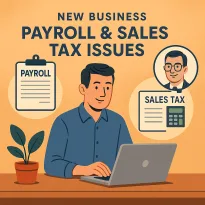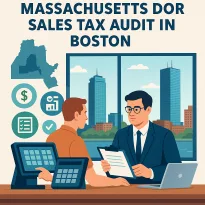Cambridge Entrepreneurs: Why New Businesses Run Into Payroll & Sales Tax Issues (And How a Neighbor CPA Can Help)
Introduction: Starting Up in Cambridge
Launching a business in Cambridge, Massachusetts is an exciting adventure. Between the innovative vibe around Kendall Square, the creative energy from MIT and Harvard, and the bustling retail and restaurant scenes in Central and Harvard Squares, it feels like the perfect city to start something new.
But while founders focus on product development, customer acquisition, or building a team, something often slips through the cracks: payroll and sales tax compliance.
As a CPA who works with entrepreneurs here in Cambridge, I’ve seen it over and over again. Bright founders with strong ideas get tripped up by Massachusetts Department of Revenue (DOR) notices they never expected. A sales tax audit or payroll tax audit can come out of nowhere and put serious strain on a young company.
The good news? With the right guidance, these issues can be managed — and even prevented. That’s where a local, approachable CPA comes in. Someone who knows the quirks of Massachusetts law, can meet you in your office or at a coffee shop in Kendall Square, and who charges rates that make sense for startups.
Why Startups Struggle With Payroll and Sales Taxes
Newly formed businesses face unique challenges with taxes. It’s not about bad intentions — it’s about bandwidth.
- Payroll taxes become a challenge the moment you hire your first employee. You must withhold federal income taxes, Social Security, Medicare, and Massachusetts income tax. You also owe employer contributions to unemployment insurance. Startups often miss a filing deadline or misclassify employees as contractors.
- Sales taxes apply in Massachusetts at 6.25% on most goods and certain services. If you sell coffee, merchandise, software, or even certain digital goods, you may need to collect and remit. Many founders assume “we’re too small” or “we don’t qualify yet,” only to find out the state thinks otherwise.
- Recordkeeping is often the weak link. When the Massachusetts DOR audits, they don’t just look at filings — they look at bank records, POS systems, payroll reports, and contracts. Startups that don’t have a bookkeeper quickly fall behind.
Cambridge is home to fast-moving entrepreneurs. But speed can mean compliance slips, and that’s exactly what attracts DOR attention.
The Cambridge Startup Environment and Tax Risks
What makes Cambridge unique is also what makes taxes complex.
- Restaurants & cafés near Harvard and MIT often run lean in their first years. But sales tax applies to prepared food, and payroll audits are common in hospitality due to high turnover and tipped employees.
- Tech startups in Kendall Square sometimes hire contractors from day one. But if Massachusetts deems them employees under its strict independent contractor rules, the business can face payroll tax audits and penalties.
- Retail shops in Central Square may believe that only large chains worry about sales tax. But the DOR doesn’t see it that way. Even small boutique shops can be audited.
- Creative entrepreneurs — yoga studios, galleries, consultants — often believe services are exempt. But add retail sales (yoga mats, merchandise, tickets) and you cross into sales tax territory.
Cambridge’s entrepreneurial energy is inspiring. But it’s also a hotspot for audits. The DOR knows there’s constant new business activity here, which makes it a target for compliance sweeps.
Real-Life Stories (Names Changed, Lessons Real)
Case 1: The Coffee Shop Payroll Audit
A small café owner near Central Square hired baristas as “contractors.” They paid via Venmo, no withholdings, no payroll system. The DOR flagged the 1099s. Suddenly, the café owed thousands in back payroll taxes, penalties, and interest. We re-classified workers, set up a payroll service, negotiated a payment plan, and avoided harsher enforcement.
Case 2: The Boutique Retail Sales Tax Audit
A Harvard Square boutique assumed clothing under $175 was tax-exempt (true in Massachusetts), but didn’t realize accessories, jewelry, and gift items still required sales tax. A DOR audit assessed back taxes. By reconstructing sales records and showing exemptions correctly, we reduced the liability by 40%.
Case 3: The Startup Software Firm
A Kendall Square startup sold SaaS subscriptions nationwide. Massachusetts considers many SaaS models taxable. The founders hadn’t collected any sales tax. With help, they registered, began collecting, and we negotiated limited look-back liability with the state.
These are not unusual. They’re typical. And they’re solvable.
Sales Tax Audit Help in Massachusetts
Why Sales Tax Audits Happen
- Late or missing returns.
- Discrepancies between reported sales and credit card processor totals.
- Industry sweeps (restaurants, retail, SaaS).
- Random audits.
The Audit Process
- Notice of Audit — usually a letter from the DOR.
- Document Request — bank statements, POS records, invoices.
- Field Audit — an auditor may visit your location.
- Assessment — proposed tax due, plus penalties and interest.
- Appeal or Resolution — negotiate, appeal, or enter a payment plan.
How a CPA Helps
- Reconstruct missing records.
- Identify items exempt from sales tax (reducing liability).
- Represent you in meetings with auditors.
- Negotiate settlements or payment plans.
For Cambridge businesses, this means less time away from running your company and more time focused on growth.
Payroll Tax Audit Help in Massachusetts
Why Payroll Audits Happen
- Misclassifying workers as contractors.
- Unemployment claims that reveal “hidden” employees.
- Inconsistent filings (941 vs. state reports).
- Tip reporting discrepancies in restaurants.
Risks
- Back payroll taxes.
- Penalties.
- Trust Fund Recovery Penalty (personal liability for business owners).
How a CPA Helps
- Review classifications (W-2 vs. 1099).
- Correct filings.
- Represent you before the DOR and IRS.
- Negotiate installment agreements.
Cambridge entrepreneurs often need help setting up payroll the right way from the beginning. A CPA makes sure filings are timely, accurate, and affordable.
Startup-Friendly Solutions
Big-firm CPAs often price out small businesses. But Cambridge entrepreneurs need startup-friendly support.
- Amicable rates: Designed for small businesses, not Fortune 500 companies.
- Flexible meetings: I can meet you at your office, a café in Kendall, or at my Cambridge meeting space.
- Hands-on help: From organizing shoebox receipts to setting up QuickBooks or Gusto.
- Approachable style: No jargon. Just straightforward explanations.
The goal isn’t just to survive an audit — it’s to set up systems that prevent future ones.
Why Work With a Neighbor CPA in Cambridge?
- Local Knowledge — I know the Massachusetts DOR, the forms, the quirks.
- Accessibility — Need me to stop by your business in Porter Square or Kendall Square? I can.
- Understanding the Startup Journey — I’ve worked with cafés, software firms, boutiques, and more.
- Trust & Approachability — You’re not dealing with a faceless firm. You’re dealing with a CPA who’s part of the community.
Cambridge is full of brilliant people building big ideas. Having a CPA who is both technical and personable can make the difference between stress and stability.
What To Do If You Receive a Notice
- Don’t ignore it. Notices don’t go away. Penalties grow quickly.
- Read carefully. Understand whether it’s payroll, sales tax, or both.
- Gather documents. Bank statements, payroll reports, invoices.
- Contact a CPA. The sooner you get help, the more options you have.
Preventive Steps for Cambridge Entrepreneurs
- Set up payroll early. Even if you only have one employee.
- Register for sales tax. If you sell taxable goods or services.
- Keep good records. Digital systems make this easier.
- Ask questions. It’s cheaper to ask upfront than to fix later.
Conclusion: Keep Building, Leave the Tax Worries to Me
Starting a business in Cambridge is thrilling. From biotech labs to coffee shops to boutique design firms, this city buzzes with entrepreneurial energy.
Don’t let payroll and sales tax issues derail your dream. With the right support, you can focus on building — and leave the tax headaches to someone who understands Cambridge, understands startups, and charges rates that won’t sink your budget.
Learn more about me today — and let’s make sure your business grows on solid ground.
Sales Tax Audit Help — Frequently Asked Questions (Massachusetts)
Yes—before making taxable sales in Massachusetts, vendors must register and obtain a sales tax account through MassTaxConnect so they can collect and remit tax. Registration is online and quick for new businesses.
Massachusetts DOR: Register your business with MassTaxConnect
Massachusetts imposes sales/use tax on most retail sales of tangible personal property and certain services. Exemptions exist (e.g., many grocery items and certain nonprofit sales). Always check the current DOR guide before assuming an item or service is exempt.
Meals sold by restaurants and similar establishments are generally taxable under state law, and many municipalities adopt a local option meals excise. Review the DOR’s meals guidance and check your city or town for any local add-on.
Generally, clothing is exempt up to the statutory threshold per item; amounts above that threshold are taxable. Special-purpose clothing (athletic/protective) is not part of the standard exemption.
Yes—if Massachusetts sales tax wasn’t collected (or was collected at a lower rate) on taxable items you use or store in the Commonwealth, use tax generally applies and is reported through MassTaxConnect.
File returns and make payments electronically in MassTaxConnect. If you file or pay late, the system automatically calculates penalties and interest.
Vendors must maintain complete and accurate records (including electronic data) that substantiate gross receipts, deductions, exemptions, and tax due. Massachusetts’ record-retention regulation outlines requirements and retention periods.
As a general rule, Massachusetts may audit within a standard period, and longer in cases like substantial understatement or failure to file. See the DOR’s audit procedures for timing and scope.
Use MassTaxConnect to verify a buyer’s sales or meals, food & beverage tax registration. Keep copies of certificates and follow DOR documentation requirements.
Yes—under Massachusetts rules, marketplace facilitators and remote sellers generally must collect and remit when they meet the state’s economic nexus thresholds.
830 CMR 64H.1.9: Remote Retailers & Marketplace Facilitators
Payroll Tax Audit Help — Frequently Asked Questions (Massachusetts & Federal)
Employers generally must withhold Massachusetts income tax on wages paid to employees for services performed in the Commonwealth (and in some cases for residents working out of state). The DOR’s guide explains registration, calculation, and filing.
Register online through MassTaxConnect to obtain your withholding account, file returns, and make payments electronically.
Massachusetts Circular M provides the current withholding tables and methods. Filing frequency and forms depend on your withholding volume and DOR instructions.
Massachusetts presumes a worker is an employee unless the strict three-part test is met (no employer control, outside the usual course of business, and an independently established trade). Misclassification can trigger audits and penalties.
The IRS may assess the TFRP against responsible persons who willfully fail to collect, account for, or pay over employment taxes. Liability can extend to owners, officers, or others with control over funds.
Maintain detailed payroll, tax, and payment records in a form that allows the DOR to verify liability. Massachusetts’ record-retention regulation covers what to keep and acceptable formats (including electronic).
The IRS outlines how employment tax returns are selected, what occurs during an exam, and appeal rights. Examinations often review deposits, Forms 941, worker classification, and tip reporting where applicable.
Use Form 941-X to correct quarterly employment tax returns; if wage statements are wrong, file Forms W-2c/W-3c as applicable. Correcting promptly can limit penalties and interest.
Yes—employers must report newly hired employees (and certain contractors) within 14 days. You can report online via MassTaxConnect or submit the state’s form.
Yes—DOR allows eligible taxpayers to request a payment agreement through MassTaxConnect. Once registered, navigate to the Collections section to request a plan.


